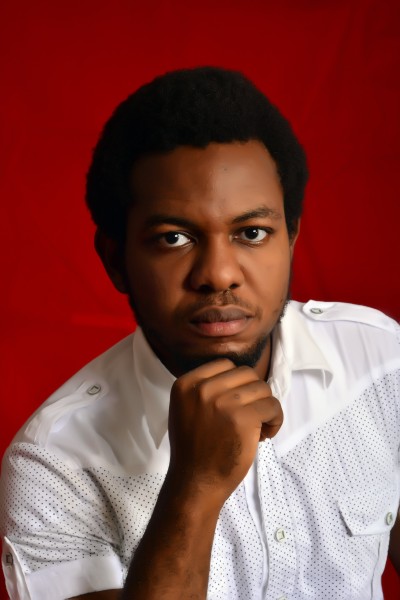
We are beyond excited to introduce our 2018 Kathy Fish Fellow, Tochukwu Okafor. Recently, we asked him about his influences, his voice, and why he’s interested in flash fiction.
Interview by Allison Pinkerton
Welcome to SmokeLong! One of the things I learned as the 2017 Kathy Fish Fellow was to harness my voice, and to speak its truth loudly. Why does the writing world need your voice?
Thank you for your having me. Because I like to think of myself as a very ambitious man, whose messianic complex has led him on a change-the-world mission, I find it limiting that my voice should be contained in the writing world only. It’s wonderful applying for workshops and fellowships and getting accepted and meeting other people who do what you do and everyone is happily existing in this hallowed space. But it is more important to me that my voice transcends these spaces. The world needs my voice as, within it, lies the many transformative and subtle truths and observations that can drive positive socio-political changes. And I’m happy we both share this truth-telling goal.
Writers often find similar themes throughout their work because they obsess over certain ideas. (Like for me, it’s the drama at crossroads of teenage girlhood and evangelical Christianity. Can’t stop; won’t stop.) What keeps your writer-brain up at night? How is your work influenced by what you can’t stop thinking about?
I find your themes very interesting. Although I don’t actively think of themes when I’m writing as I like the idea of writing freely, I work with themes for particular periods. Throughout the year 2015, for example, everything I wrote centered on family. I was very interested in the complexities and human politics that could arise in a family. For a better part of last year, I wrote stories that mostly concerned themselves with sexuality and religion. I often find myself drawn to the different permutations of a particular theme. But because I can get conscious about enjoying my writing process even when writing is the last thing I want to do, I try not to be limited by a theme. I permit the characters to take over, and in the end, the story emerges with more glorious surprises than the ones I had planned out in my head.
Reading is an important part of a writer’s process. Which authors influence you the most?
My parents. I grew up reading their handwritten notes that they left between the pages of their Bibles. Though it was difficult to read the notes as they were mostly abbreviated words and long lists of phrases in vocabularies that the four-year old me could make no sense of, I found it interesting that they could understand what they had written and no one else could. But I can’t be a better writer if all I read were my parents’ notes. And it isn’t always the authors who do the influencing but their works. I have come to be very influenced by the South African author, Karen Jennings. She is very brilliant and I wish the whole world will read her books. I am hopelessly in love with Chinua Achebe’s writing. I am very drawn to Leo Tolstoy, Fyodor Dostoevsky, Virginia Woolf, Nadine Gordimer, Margaret Atwood, Jim Crace, Haruki Murakami, J.R.R Tolkien, Clarice Lispector, Michael Ondaatje, Alice Munro, Toni Morrison, Patrick Modiano—you know what, there are so many of them. I imagine them as my elder uncles and aunts. There are many other authors whose works have influenced me greatly and in the most subtle ways and, if I were to start mentioning them, I think I would make a mess of the whole thing.
The SmokeLong team provided me with a writing community that really benefited my work during my time as the Kathy Fish Fellow. What’s your writing community like in Nigeria?
I don’t think of the writing community in Nigeria as a centralized body where all Nigerian writers come to take shelter. Nigerian writers are everywhere, building their own communities if they can, where they can. And the communities keep on growing. People want to tell their own stories, which I find very charming.
“Write what you know.” Do you agree? Disagree? Find the whole concept outdated? Why?
Let me make a quick confession: I was one of those many writers who started out with writing what he knew and stuck with it for many years. Now my little secret is out, I can say that writing what you know is outdated and boring and utterly unambitious. For the years that I stuck with writing what I knew, I learnt nothing and invented nothing. Writing is an art. With art comes creativity. With creativity comes innovation. Writing what you know is akin to writing what you have read or have been taught. Which is totally lacklustre. I think most of what I know is very boring; why then should I put it on a page? To bore my readers even more? I don’t wish to walk down that path.
Throughout my time as the Fellow, I found the constraints of flash helped me to be more creative, and helped me to engage with my work on a sentence level. Why do you write flash?
I began writing flash only three years ago. I would work on my horrible novel, write short stories, and then write some very tiny stories that I couldn’t really place. I never knew that those “tiny stories” were called flash fictions. At some point, I had wanted to stop writing them because I had felt that no one on this planet would be interested in reading them. In fact, I didn’t know that journals published flash fictions (though I find it very suspicious that some major journals and magazines call them “short short stories.”) I like that you have asked me this question because it has made me reflect deeply. My first completed flash fiction was written out of a place of urgency. I wanted to be stark. I wanted to cage so many feelings in less words. In retrospect, I think I was successful because when it was published, people loved it. I was mostly overwhelmed by the people who reached out to me to say that they read the story and that it meant this and that to them. Before then, I have had a few short stories published, but the flash fiction was the first to receive a very serious review. (I don’t usually read reviews but I read this particular review of my work and I loved it. No, the reviewer didn’t praise my work—give me at least that much credit.) Flash is a form that I find easy to experiment with. The rebellious side of me wishes to write more flash in the future to reject this insidious idea of flash as “less serious” or “less accomplished” versions of short stories and novels.
Tochukwu Emmanuel Okafor is a Nigerian writer. His work has appeared in The Guardian, Litro Magazine, Harvard University’s Transition Magazine, Warscapes, Columbia Journal, and elsewhere. A 2018 Rhodes Scholar finalist, he has been twice nominated for the Pushcart Prize and the Short Story Day Africa Prize for Short Fiction. He has been shortlisted for the 2016 Southern Pacific Review Short Story Prize and the 2016 Problem House Press Short Story Prize. In 2014 he was awarded the Comptroller Charles Edike Prize for Outstanding Essays. He is an alumnus of the 2015 Association of Nigerian Authors Creative Writing Workshop and the 2016 Short Story Day Africa Writing Workshop, and a two-time recipient of the Festus Iyayi Award for Excellence for Prose and Playwriting (2015/2016).
 Allison Pinkerton was the 2017 Kathy Fish Fellow at SmokeLong Quarterly. Her fiction is forthcoming in Image, and has been published online at Passages North, The Pinch, and elsewhere.
Allison Pinkerton was the 2017 Kathy Fish Fellow at SmokeLong Quarterly. Her fiction is forthcoming in Image, and has been published online at Passages North, The Pinch, and elsewhere.


 The core workshop of SmokeLong Fitness is all in writing, so you can take part from anywhere at anytime. We are excited about creating a supportive, consistent and structured environment for flash writers to work on their craft in a community. We are thrilled and proud to say that our workshop participants have won, placed, or been listed in every major flash competition. Community works.
The core workshop of SmokeLong Fitness is all in writing, so you can take part from anywhere at anytime. We are excited about creating a supportive, consistent and structured environment for flash writers to work on their craft in a community. We are thrilled and proud to say that our workshop participants have won, placed, or been listed in every major flash competition. Community works.